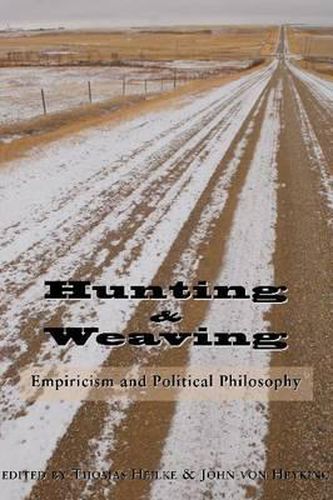Readings Newsletter
Become a Readings Member to make your shopping experience even easier.
Sign in or sign up for free!
You’re not far away from qualifying for FREE standard shipping within Australia
You’ve qualified for FREE standard shipping within Australia
The cart is loading…






The essays in this volume honor the work of political scientist and Eric Voegelin scholar, Barry Cooper, by considering how political philosophy (a form of hunting) and empiricism get woven together (to borrow a metaphor from Plato). In other words, they consider how science needs to be conducted if it is to remain true to our commonsense experience of the world and to facilitate political judgment.
Several of the essays cover Eric Voegelin, including his understanding of consciousness, a comparison of him and Leo Strauss, and his self-understanding as a scholar. Other essays consider terrorism, technology, religion and the modern world, the divided line in Plato’s Republic, and the political significance of hope. The volume also includes a number of essays that consider different aspects of Canadian politics, including its strong regionalism, political culture, public law, and the infamous Calgary School of political science.
These essays are united by the concern that political science must weave together political philosophy and empiricism. This task was what Aristotle meant when he characterized political science as a matter of practical wisdom. It is an insight that was also central for Voegelin’s restoration of political science in the twentieth century, and that these essays continue into the twenty-first century.
Political analysis begins in whatever contemporary crisis the analyst has found himself. The analyst sifts through competing claims of political meaning asserted by the partisans in the crisis. From there he ascends to greater luminosity concerning the human condition by viewing those claims in light of the major questions in the history of political thought. They inform one another, as the search for order is necessarily the search for order that is conducted by a particular individual’s consciousness in the context of a particular community in space and time.
This volume will be of special interest to scholars of political philosophy as well as citizens and statesmen interested in how an engagement in the history of political philosophy can facilitate political judgment in particular political circumstances.
$9.00 standard shipping within Australia
FREE standard shipping within Australia for orders over $100.00
Express & International shipping calculated at checkout
The essays in this volume honor the work of political scientist and Eric Voegelin scholar, Barry Cooper, by considering how political philosophy (a form of hunting) and empiricism get woven together (to borrow a metaphor from Plato). In other words, they consider how science needs to be conducted if it is to remain true to our commonsense experience of the world and to facilitate political judgment.
Several of the essays cover Eric Voegelin, including his understanding of consciousness, a comparison of him and Leo Strauss, and his self-understanding as a scholar. Other essays consider terrorism, technology, religion and the modern world, the divided line in Plato’s Republic, and the political significance of hope. The volume also includes a number of essays that consider different aspects of Canadian politics, including its strong regionalism, political culture, public law, and the infamous Calgary School of political science.
These essays are united by the concern that political science must weave together political philosophy and empiricism. This task was what Aristotle meant when he characterized political science as a matter of practical wisdom. It is an insight that was also central for Voegelin’s restoration of political science in the twentieth century, and that these essays continue into the twenty-first century.
Political analysis begins in whatever contemporary crisis the analyst has found himself. The analyst sifts through competing claims of political meaning asserted by the partisans in the crisis. From there he ascends to greater luminosity concerning the human condition by viewing those claims in light of the major questions in the history of political thought. They inform one another, as the search for order is necessarily the search for order that is conducted by a particular individual’s consciousness in the context of a particular community in space and time.
This volume will be of special interest to scholars of political philosophy as well as citizens and statesmen interested in how an engagement in the history of political philosophy can facilitate political judgment in particular political circumstances.